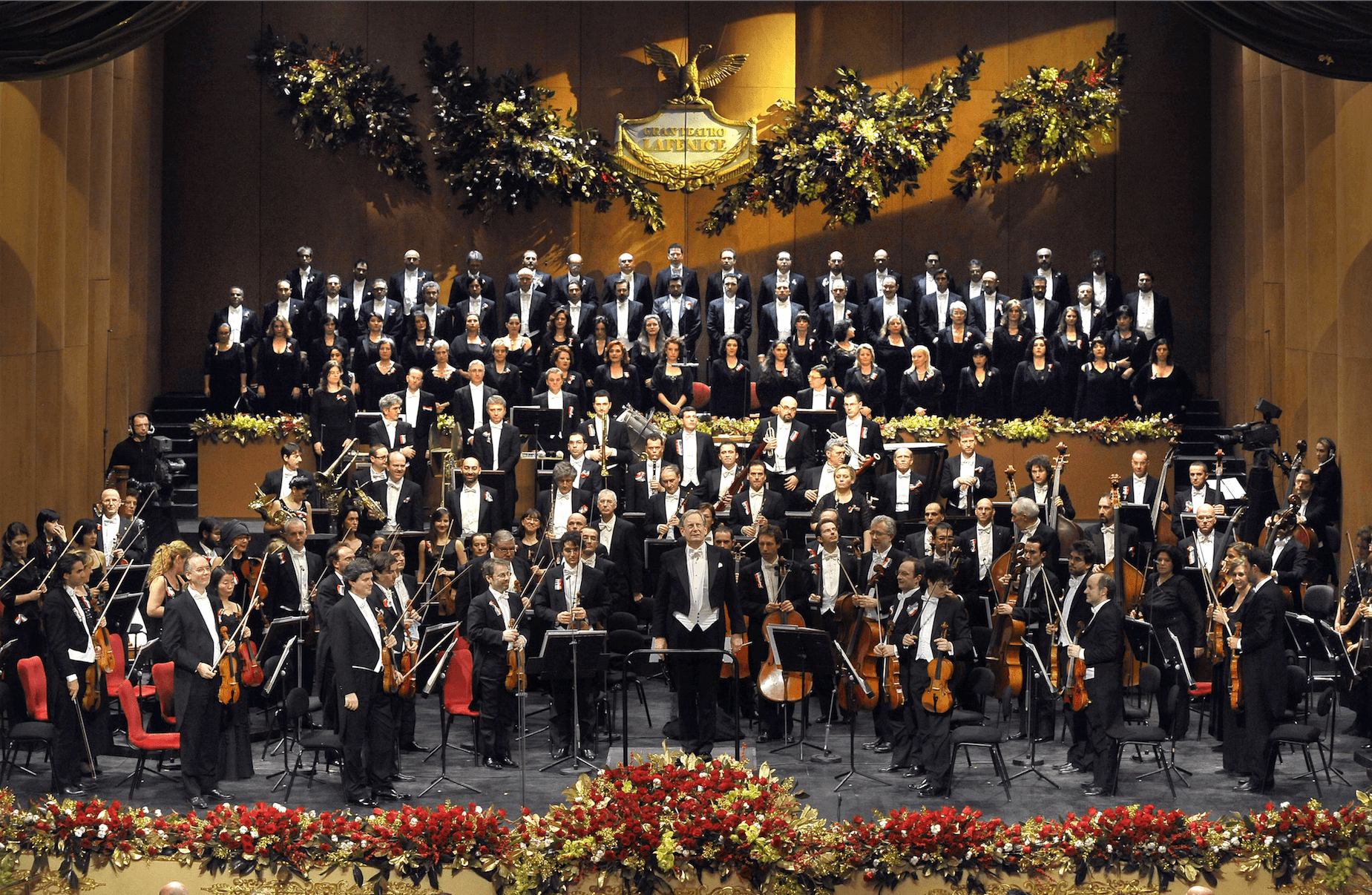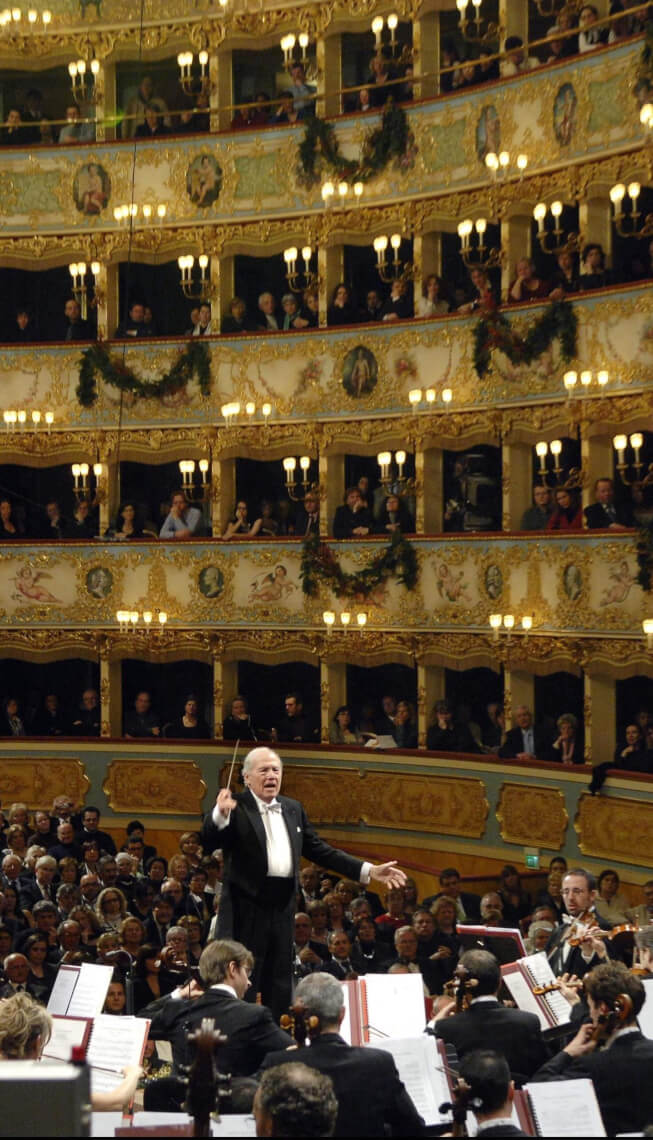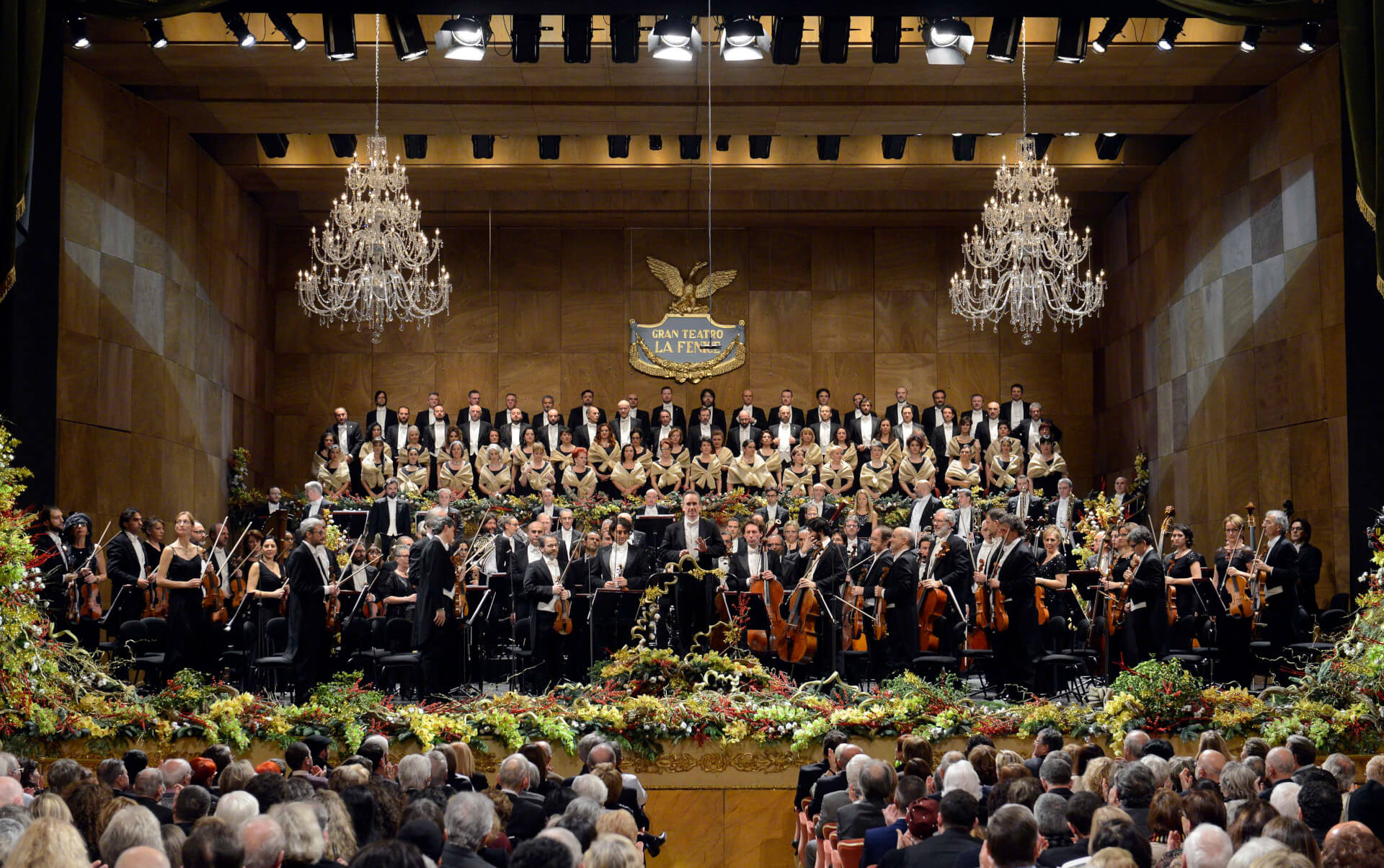La Fenice Orchestra & Choir
Two noble faces of music without which La Fenice wouldn't exist. This is the part of the site dedicated to them, where you may read more about their historyThe Orchestra & Choir
Two noble faces of music without which La Fenice wouldn’t exist. This is the part of the site dedicated to them, where you may read more about their history
La Fenice Orchestra
The history of the Orchestra & Chorus is connected with the history of the theatre, an important production centre that during the nineteenth century performed several ‘premières’ of fundamental operas for the history of Melodrama.

MEMBERS
- Roberto Baraldi (Concertmaster)
- Margherita Miramonti (concertino)
- Antoaneta Daniela Arpasanu
- Alessia Avagliano
- Federica Barbali
- Mauro Chirico
- Andrea Crosara
- Ilaria Marvilly
- Sara Michieletto
- Martina Molin
- Annamaria Pellegrino
- Giacomo Rizzato
- Xhoan Shkreli
- Anna Trentin
- Maria Grazia Zohar
- Alessandro Cappelletto (I)
- Gianaldo Tatone (I)
- Samuel Angeletti Ciaramicoli (II)
- Nicola Fregonese (II)
- Fjorela Asqeri
- Alessandro Ceravolo
- Kanda Chiaki
- Valentina Favotto
- Emanuele Fraschini
- Davide Giarbella
- Davide Gibellato
- Luca Minardi
- Carlotta Rossi
- Elizaveta Rotari
- Eugenio Sacchetti
- Petr Pavlov (I)
- Antonio Bernardi (II)
- nwbr* (II)
- Maria Cristina Arlotti
- Elena Battistella
- Valentina Giovannoli
- Anna Mencarelli
- Marco Scandurra
- Matteo Torresetti
- Davide Toso
- Lucia Zazzaro
- Giacomo Cardelli (I)
- Marco Trentin (II)
- Valerio Cassano
- Audrey Lucille Sarah Lafargue
- Antonio Merici
- Filippo Negri
- Antonino Puliafito
- Matteo Liuzzi (I)
- Stefano Pratissoli (I)
- Leonardo Galligioni (II)
- Walter Garosi (II)
- Marco Petruzzi
- Denis Pozzan
- Gianluca Campo (I)
- Matteo Armando Sanpaolo (I)
- Fabrizio Mazzacua
- Alice Sabbadin
- Silvia Lupino
- Rossana Calvi (I)
- Andrea Paolo De Francesco (I)
- Carlo Ambrosoli
- Angela Cavallo
- Vincenzo Paci (I)
- Simone Simonelli (I)
- Federico Ranzato
- Fabrizio Lillo
- Nicolò Biemmi (I)
- Marco Giani (I)
- Riccardo Papa
- Fabio Grandesso
- Andrea Corsini (I)
- Vincenzo Musone (I)
- Loris Antiga
- Tea Pagliarini
- Dario Venghi
- Piergiuseppe Doldi (I)
- Alberto Capra
- Giovanni Lucero
- Eleonora Zanella
- Giuseppe Mendola (I)
- Domenico Zicari (I)
- Federico Garato
- Alberto Azzolini
- Dimitri Fiorin (I)
- Barbara Tomasin (I)
- Paolo Bertoldo
- Claudio Cavallini
- Diego Desole

The history of La Fenice Orchestra is associated with that of the theatre, which held such an important place in opera in the nineteenth century, with premières including Semiramide, I Capuleti e i Montecchi, Rigoletto, and La traviata. The second half of the century brought an internationalisation of repertory, broadened also by symphony concerts and collaboration with leading soloists (among them Enrico Mainardi, Mstislav Rostropovich, Edwin Fischer, Aldo Ferraresi, Arthur Rubinstein). In the course of the nineteenth and twentieth centuries the orchestra was directed by leading conductors and composers, including Lorenzo Perosi, Giuseppe Martucci, Antonio Guarnieri, Richard Strauss, Richard Wagner, Pietro Mascagni, Giorgio Ghedini, Ildebrando Pizzetti, Goffredo Petrassi, Alfredo Casella, Gian Francesco Malipiero, Willy Ferrero, Leopold Stokowski, Fritz Reiner, Vittorio Gui, Tullio Serafin, Giuseppe Del Campo, Nino Sanzogno, Ermanno Wolf-Ferrari, Carlo Zecchi, John Barbirolli, Herbert Albert, Bruno Walter, Franco Ferrara, Guido Cantelli, Thomas Schippers, and Dimitri Mitropoulos. In 1938 La Fenice became an autonomous entity and the orchestra was developed further with active participation in the Festival of Contemporary Music of the Biennale. In the 1940s and 1950s under the guidance of Toscanini, Scherchen, Bernstein, and Celibidache (with a complete cycle of Beethoven symphonies), Konwitschny (with Wagner’s Ring cycle), and Stravinsky, the orchestra presented a series of historic concerts. In the following years the most distinguished conductors worked with the orchestra, among them Bruno Maderna, Vladimir Delman, Herbert von Karajan, Karl Böhm, Claudio Abbado, Riccardo Muti, Georges Prêtre, Eliahu Inbal, Seiji Ozawa, and Lorin Maazel. Contemporary operas in the 1950s included Britten’s The Turn of the Screw and Stravinsky’s The Rake’s Progress, and in more recent years the first Italian production of Aus Deutschland and the world premières of Mauricio Kagel’s Entführung im Konzertsaal, Adriano Guarnieri’s Medea, Luca Mosca’s Signor Goldoni, and Claudio Ambrosini’s Il killer di parole. In concerts the orchestra has undertaken cycles, including those dedicated to Berg and to Mahler, under the direction of conductors such as Sinopoli, Kakhidze, Masur, Barshai, Tate, Ahronovitch, Kitajenko, Inbal, and Temirkanov. The orchestra tours regularly in Italy and abroad. Principal conductors have included Eliahu Inbal, Vjekoslav Sutej, Isaac Karabtchevsky and Marcello Viotti; and among guest conductors Jeffrey Tate. Most significant concerts: Bach’s Christmas Oratorio with Riccardo Chailly, Britten’s War Requiem with Bruno Bartoletti, Maderna’s Requiem with Andrea Molino.

MEMBERS
CHOIR MASTER
Alfonso Caiani
ASSISTANT CHOIR MASTER
Chiara Casarotto
REPETITEURS
Raffaele Centurioni
Roberta Ferrari
Roberta Paroletti
Maria Cristina Vavolo
- Bazzo Elena
- Bozzo Serena
- Braga Lucia
- Carrari Brunella
- Casale Caterina
- Conti Emanuela
- Di Munno Katia
- Ermacora Milena
- Gomiero Carlotta
- Madeddu Alice
- Malvasio Anna
- Mazzamuto Sabrina
- Meridda Antonella
- Pavan Alessia
- Raicevich Lucia
- Rakhsha Ramezani Meiami
- Salaro Ester
- Savino Elisa
- Mi Jung Won
- Bonera Mariateresa
- Celanzi Rita
- Codognola Marta
- De Pian Claudia
- Fincato Maria Elena
- Forni Simona
- Franco Alessia
- Gianolla Silvia Alice
- Han Yeoreum
- Kolosova Liliia
- Marzaro Eleonora
- Poropat Francesca
- Posocco Orietta
- Rossi Nausica
- Vavasori Alessandra
- Youn Da Hye
- Altobelli Domenico
- Biscontin Andrea
- D’Adamo Damiano Cosimo
- D’Ostuni Dionigi
- Dandaza Angel Miguel
- De Benedetto Salvatore
- Deriu Giovanni
- Godoy Victor Hernan
- Korkmaz Safa
- Masiero Enrico
- Masino Eugenio
- Mattiazzo Carlo
- Meggiolaro Stefano
- Neglia Mathia
- Rumori Marco
- Squizzato Massimo
- Vannucci Alessandro
- Accolla Giuseppe
- Agostini Carlo
- Borghetti Enzo
- Casagrande Antonio
- Esposito Emiliano
- Giacalone Salvatore
- Imbrenda Umberto
- Liva Massimiliano
- Ludovici Luca
- Marton Gionata
- Migliorin Massimiliano
- Nalesso Nicola
- Pedrini Emanuele
- Spano’ Roberto
- Zanette Franco

It is a stable ensemble whose members are selected through international competitions. In addition to its commitment to the theatre’s opera programming (on and off-site), the Chorus has progressively added a growing presence in the sacred, symphonic and chamber music repertoire. Today, it is also a mainstay in Fenice’s symphonic programming and performs concerts in Italy and abroad both with the Fenice Orchestra and in autonomous formations or with other orchestral ensembles. In the post-war period, Sante Zanon, Corrado Mirandola, Aldo Danieli, Ferruccio Lozer, Marco Ghiglione, Vittorio Sicuri, Giulio Bertola, Giovanni Andreoli, Guillaume Tourniaire, Piero Monti, Emanuela Di Pietro, and Claudio Marino Moretti have taken care of the daily preparation. Currently, the Chorus Master is Alfonso Caiani. Conductors with whom the Choir has collaborated in recent times include Abbado, Ahronovitch, Arena, Bertini, Campori, Campori, Chung, Clemencic, Dantone, Ferro, Fournier, Gardiner, Gavazzeni, Gelmetti, Horvat, Inbal, Kakhidze, Kitajenko, Maazel, Marriner, Melles, Muti, Oren, Pesko, Prêtre, Santi, Semkov, Sinopoli, Tate, Temirkanov, Thielemann.
The repertoire ranges from the 16th to the 21st century. Recordings include “Il barbiere di Siviglia” with Claudio Abbado and Massenet’s “Thaïs” with Marcello Viotti. Significant engagements in recent years include Bach’s “Christmas Oratorio” and “Mass in B minor” with Riccardo Chailly and Stefano Montanari, Britten’s “War Requiem” with Bruno Bartoletti, Verdi’s “Requiem Mass” with Myung-Whun Chung, Luigi Nono’s “Intolleranza 1960” and Giuseppe Sinopoli’s “Lou Salomé” with Lothar Zagrosek, Gluck’s “Alceste” with Guillaume Tourniaire, two monographic concerts dedicated to Arvo Pärt and to Ives, Cage and Feldman with Claudio Marino Moretti, the world premieres of Bruno Maderna’s “Requiem”, Claudio Ambrosini’s “Killer of Words” with Andrea Molino, Filippo Perocco’s “Aquagranda” and Giorgio Battistelli’s “Baruffe”. In 2018, the Chorus opened the concert season of the Berlin Konzerthaus by performing, together with the Konzerthausorchester and conducted by Juraj Valčuha, Verdi’s “Messa da Requiem”.



